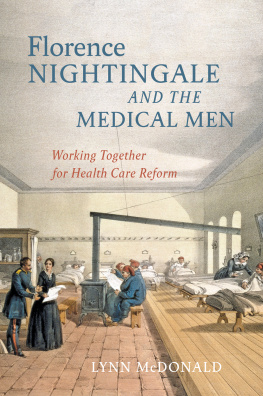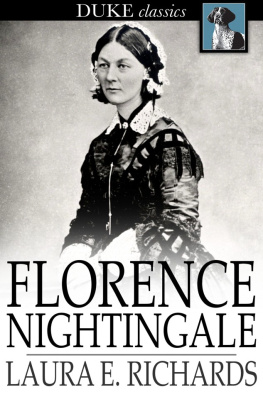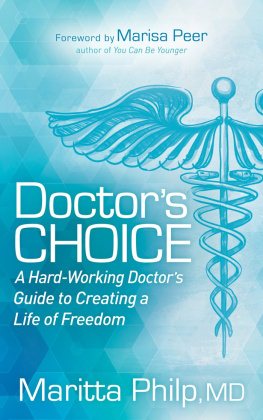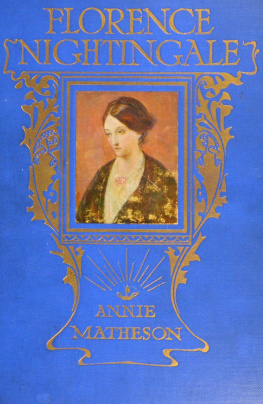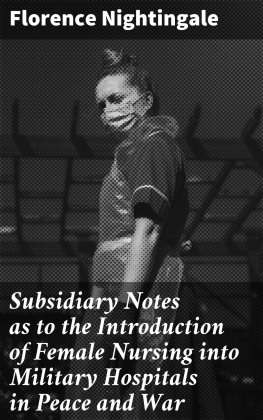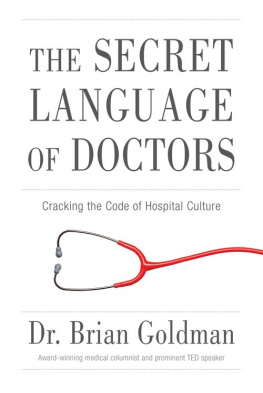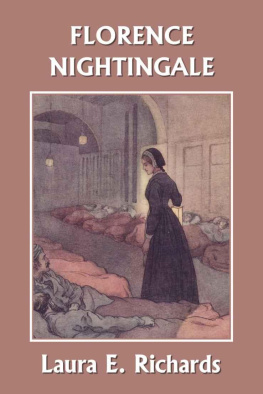Contents
Page List
Guide

FLORENCE NIGHTINGALE and the MEDICAL MEN
FLORENCE NIGHTINGALE and the MEDICAL MEN
Working Together for Health Care Reform
Lynn McDonald
McGill-Queens University Press
Montreal & Kingston London Chicago
McGill-Queens University Press 2022
ISBN 978-0-2280-1092-0 (cloth)
ISBN 978-0-2280-1203-0 (paper)
ISBN 978-0-2280-1319-8 (ePDF)
ISBN 978-0-2280-1320-4 (ePUB)
Legal deposit third quarter 2022 Bibliothque nationale du Qubec
Printed in Canada on acid-free paper that is 100% ancient forest free (100% post-consumer recycled), processed chlorine free
This book has been published with the help of a grant from the Canadian Federation for the Humanities and Social Sciences, through the Awards to Scholarly Publications Program, using funds provided by the Social Sciences and Humanities Research Council of Canada.
We acknowledge the support of the Canada Council for the Arts.
Nous remercions le Conseil des arts du Canada de son soutien.
Library and Archives Canada Cataloguing in Publication
Title: Florence Nightingale and the medical men : working together for health care reform / Lynn McDonald
Names: McDonald, Lynn, 1940- author.
Description: Includes bibliographical references and index.
Identifiers: Canadiana (print) 20220171963 | Canadiana (ebook) 20220172013 | ISBN 9780228010920 (cloth) | ISBN 9780228012030 (paper) | ISBN 9780228013198 (ePDF) | ISBN 9780228013204 (ePUB)
Subjects: LCSH: Nightingale, Florence, 1820-1910. | LCSH: Nursing Great Britain History 19th century. | LCSH: Mentoring in medicine Great Britain History 19th century. | LCSH: Hospital care Great Britain Safety measures History 19th century. | LCSH: Medical statistics History 19th century.
Classification: LCC RT37.N5 M32 2022 | DDC 610.73092 dc23
This book was designed and typeset by Peggy & Co. Design in 11/14 Adobe Garamond Pro.
In 1897, to hospital reformer Sydney Holland Nightingale said: Keep what you know is right before you, and never cease trying to get it. Aim high and people will follow you in the end No, no, no one can be neutral in this life; you are either doing good or bad, and the very fact of not trying to do good is bad in itself.
Sydney Holland, Viscount Knutsford, In Black and White, 154
CONTENTS
FIGURE AND TABLES
Figure
Tables
PREFACE
This book closes my work on Florence Nightingale, or at least book-length publication. My work on her began in the 1970s when as a social scientist, not a nurse or doctor I began to search for the women who made serious contributions to sociological and political theory, but were ignored in the standard textbooks and books of reading on those subjects. Nightingale was one of many missing persons I found. She was a particularly fine example, an early social scientist and adept at statistics. Sociology students were pleased to hear about her work. She, accordingly, appears, a mere four pages, in my Early Origins of the Social Sciences (McGill-Queens University Press, 1993). She was given substantial sections in my next two books, on the women founders themselves, in 1994 and 1998. A 16-volume Collected Works of Florence Nightingale made available the full range of her writing, published and unpublished, from all over the world (Wilfrid Laurier University Press, 200112). That might have done it, but four more non-peer-reviewed, invited books, with different publishers, appeared in 2010, 2017, 2018, and 2020.
This book closes the gap that remained: Nightingales work with doctors, evident throughout but not dealt with explicitly.
A word of explanation may be required on the use of Medical Men in the title with, if not, for a feminist author, an apology. Nightingale supported womens entry into medicine, although she never made it a cause, as she did reducing high hospital death rates in war, founding the nursing profession, making regular, civilian hospitals safer, and promoting sanitation and social conditions in India. Women come into this book, then, but in small numbers, in chapter 6. Yet it is clear that the great breakthroughs Nightingale made the causes just mentioned occurred in collaboration with leading men, doctors. This book, with a return to McGill-Queens University Press as the publisher, tells that story.
Thanks are due to the director of McGill-Queens, Philip Cercone, for seeing this through, over many years. Thanks go to Janice Hicks, at the University of Guelph, and to Lesley Mann, for technical assistance, and to Ken Simons, for assistance on the index. Finally, I express my appreciation to friends and colleagues in the Nightingale Society, formed in 2012 to promote knowledge of her work and legacy.
Lynn McDonald
Toronto, March 2022
DRAMATIS PERSONAE
Dr Henry Dyke Acland (18151900), Regius professor of medicine, Oxford
Dr Elizabeth Garrett Anderson (18361917), first woman to qualify in medicine in England
Dr Thomas Graham Balfour (18131891), director, Army Statistical Department
Dr John Shaw Billings (18381913), Civil War doctor, designer of Johns Hopkins University Hospital
Dr Elizabeth Blackwell (18211910), first woman doctor, friend
Henry Bonham Carter (18271921), cousin, secretary, Nightingale Fund Council
Dr Sir James Clark (17881870), physician to Queen Victoria
Dr John Croft (18331905), medical instructor to the nurses, St Thomas Hospital, London
Dr William Farr (18071883), superintendent of statistics, General Register Office
Dr C.H. Fasson (c. 18211892), medical superintendent, Edinburgh Royal Infirmary
(Sir) Douglas Galton (182299), RE, hospital architect, major colleague
Sidney Herbert (Lord Herbert) (18101861), MP, secretary of state for war, head of royal commission
Dr Thomas Gilham Hewlett (18311889), medical officer of health, Bombay
Sir John McNeill (17951883), head of Supply Commission, Crimean War
Dr Sir William Mure Muir (18191905), director-general, Army Medical Department
Dr (Sir) James Paget (18141899), surgeon, St Bartholomews Hospital, London, surgeon to Queen Victoria
Dr Edmund A. Parkes (18191876), first professor of military hygiene, Army Medical School
(Sir) William Rathbone (18191902), MP, workhouse-infirmary philanthropist, Liverpool
Dr (Dame) Mary Ann Scharlieb (18451930), pioneer woman doctor in India
Dr James Y. Simpson (18111870), pioneer of chloroform use, hospital reformer
Dr Andrew Smith (17971872), director-general, Army Medical Department
Dr John Sutherland (18081891), head of Sanitary Commission, major colleague
Sir Harry Verney (18011894), brother-in-law, chair of Nightingale Fund Council
Dr C.J.B. Williams (18051889), physician at University College Hospital, London
FLORENCE NIGHTINGALE and the MEDICAL MEN
THE LIFE and TIMES of FLORENCE NIGHTINGALE
Florence Nightingale was born on 12 May 1820 in Florence, Italy, the younger daughter of William Edward Nightingale (17941874), who had inherited a vast lead fortune from his great-uncle Peter Nightingale, on condition of his taking the Nightingale name, and of Frances Smith (17881880), daughter of a radical MP and abolitionist, William Smith. The elder daughter, Frances Parthenope (18191890), later Lady Verney, was born the previous year in Naples (Parthenope in Greek). The Nightingales returned to England in 1821.

